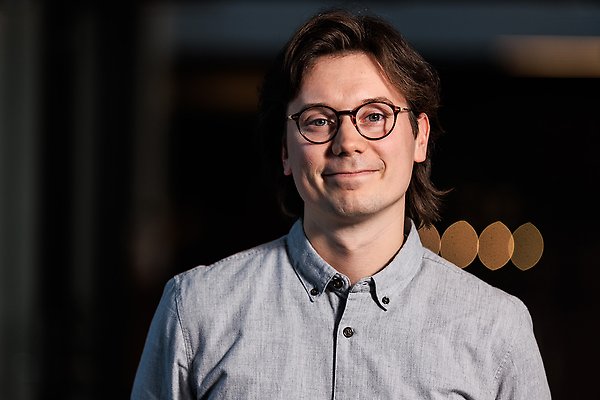Better batteries with new gas analysis technology

When Robin Lundström started as a doctoral student, he was asked to further develop the gas analysis technology developed by Erik Berg, Professor at the Department of Chemistry – Ångström Laboratory. Photo: Tobias Sterner
The automotive industry is devouring batteries as the demand for electric vehicles grows. An innovation from the Department of Chemistry – Ångström Laboratory makes batteries last and can facilitate the transition from fossil fuels to renewables.
These are hectic times for Robin Lundström, a doctoral student at the Department of Chemistry – Ångström Laboratory. His thesis defence is scheduled for March 2024, and a first draft of his thesis must be completed by Christmas. He is also the CEO of Metrilytics, a company he founded with colleagues Erik Berg and Casimir Misiewicz to offer a new solution for gas analysis of commercial battery cells.
“Batteries are an important component in the transition to a fossil-free society, but they are a bottleneck. The batteries that come on the market must therefore be of high quality so that they last a long time, and this is where our technology can make a difference,” says Robin Lundström.
The technology that the company works with is called Online Electrochemical Mass Spectrometry, OEMS. A mass spectrometer is connected to battery cells to study gas evolution with the intention of gaining detailed knowledge of how the battery behaves, and consequently, assessing its overall performance.

The technology allows gas evolution to be analysed in several battery cells in parallel and can also be used on larger batteries for electric vehicles, for example. Photo: Tobias Sterner
What makes the researchers’ system unique is that several battery cells can be analysed in parallel and it can be used on larger batteries. This makes it suitable for screening batteries in industry, where high throughput is required. Gas analysis is usually very time consuming, and thus far the method has not been used in industrial applications.
Attractive for industry
“This is a strong technology that is very relevant, not only for us as researchers, but also for industry when developing new materials. The gas evolution changes greatly depending on how you change the cell chemistry in the battery cells, and the technology is so sensitive that you can look at reactions that are very easy to miss with other technology but that can have a major impact on the quality of the battery,” explains Robin Lundström.
The journey with Metrilytics officially began in the spring of 2023, but it is the result of many years of research that included the involvement of industry. The researchers realised early on that there was great interest in their work.
“When we published our results, people contacted us and showed interest in both running experiments and buying the system itself. Since all three of us enjoy working with technology development, taking this commercial is a combination of benefit and pleasure,” says Robin Lundström.
Exciting market in Sweden
Metrilytics has made a first sale on a part of the system and talks daily with potential customers at all levels, from battery material developers to battery manufacturers and all the way up to the automotive industry.
“Our focus now is on building up battery manufacturers’ confidence in us by showing that we have a working product. The plan is to have a complete system at some reference customers by the summer so that interested companies have somewhere that they can test the technology,” explains Robin Lundström.
He believes that Sweden is a very interesting battery country which, together with the rest of Europe, is the company’s target market right now. And he is very confident about the future of the company.
“I think we will find our place on the market given that we have managed to scale up the technology from research cells to industrial battery cells, but it will be a lot of work to get there.”

Robin Lundström, a doctoral student at the Department of Chemistry – Ångström Laboratory and the CEO of Metrilytics. Photo: Tobias Sterner
However, going full-time with the company right after earning his PhD is not in his plans.
“I will have one foot in research, at least for a while longer, but it is clear that a lot of focus will be on the company. The combination is interesting and it is very cool to see that something you have worked very hard on for several years can actually do some good. With this technology, we feel that we are contributing to a more sustainable future,” says Robin Lundström.
Sara Gredemark
